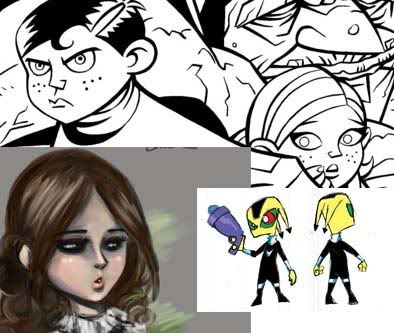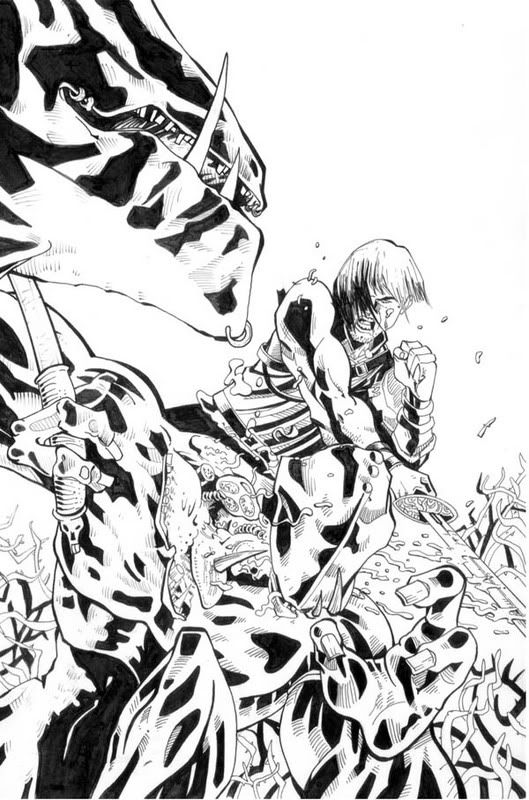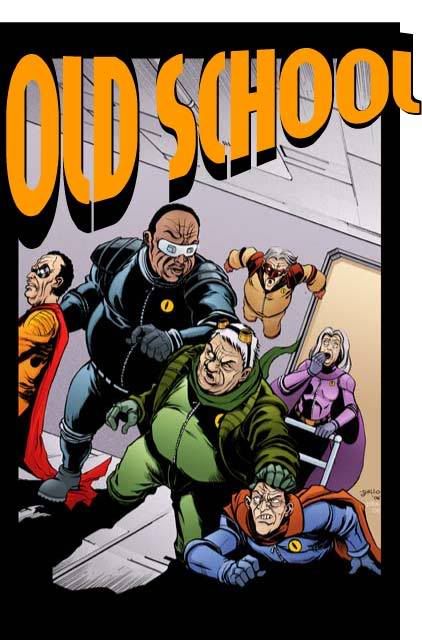The Girl with the Half-Moon Eyes
By Robert Burke Richardson
A field of purple flora, sea-green at the ridges, stretches all the way to a red-tinged horizon. The plants give off a fragrance like too much perfume, but the dry air retains a desert essence on your tongue. You turn 180 degrees and study the prefab buildings just to reassure yourself you’re still on planet Earth and weren’t transported -- as you sometimes wish -- to an alien world while napping on the plane.
Doctor Sawnhey walks carefully between rows of knee-high sorghum hybrids on a series of white boards resting on the coffee-brown topsoil. Her skin is tan, but she doesn’t look like an Iraqi. She speaks in a European accent you’re not worldly enough to identify. “Welcome to the Biogenic Oil Reclamation Project,” she says, squeezing a greeting into your hand. You wonder how she keeps her skin so cool in the heat. “The boards we’re walking on are made from coconut husks,” she says. “People pay us to haul the husks away in some tropical countries. Both fiber and pith are extremely high in lignin and phenolic content.”
You flip your handheld open, but your eyes are already scanning the strange horizon for the real story. Twin dump-trucks lead dust clouds in from the dunes to the South.
Sawnhey pulls an edge-worn card from the pocket of her lab coat and hands it to you. It is a painting of a leafy, olive-green plant. “Let’s head for the refinery,” she says, inclining her head toward a large wood-and-plastic structure off to the right. “This was our first-stage plant,” Sawnhey says, taking the picture back. “It drew the pollutants from the soil and turned them into the hemp rope we used to hang the warmongers with.” She glances at your eyes, and continues only when you don’t visibly react. “The plants then became fertilizer for the intermediary phase, which created the top-soil.”
“And then you grew these purple plants?” you ask. “The ones that produce petroleum?”
Pleased by your understanding, Sawnhey stomps a little foot. “This ground is probably the second richest oil-field on the entire planet, and all the locals ever did was squabble with each other. At long last they have become part of the solution, rather than all of the problem.”
Sawnhey stops and turns to you confidentially. You are just outside the refinery now, and can hear machines pounding out a complicated rhythm. “I don’t mean to be racist, but have you ever seen an Iraqi?” You shake your head no, and Sawnhey leans in closer. Her breath is sterile, like an instrument in a hospital. “The buggers are really oily,” she says. “You can see it in their pores.”
You step around Sawnhey and head toward the dump-trucks, which are just pulling up. Forget the refinery -- you don’t want to see how the machines extract plastics and petroleum from the plants. That isn’t the story. You came here to see bodies.
“No pictures,” Sawnhey reminds you over the scuff of her sensible shoes on the unnatural boards.
One of the drivers is Asian, the other Caucasian. Men and women of a dozen different ancestries stand around a large, shallow pit holding hoes, shovels, axes, and saws. The first truck backs into position with a series of warning beeps, then dumps its cargo into the shallow pit. You are surprised to see that most of the bodies are young Hindi women, lushly proportioned but with the kiss of youth still fresh on their faces. Some wear clothes of cotton or other biodegradable fabric, some are naked, with tattoos on their arms and breasts. The fragrant plants are not enough to mask the smell as the beautiful women fall one on top of the other in the coffee-colored dirt.
The workers begin hacking and digging, mixing the blood and bodies with soil. A corpse with curious half-moon eyes stares at you until you are forced to turn away. Doctor Sawnhey comes to stand at your shoulder. “Nature makes oil from biogenic matter,” she says, “but it’s a slow process. We’ve improved on it a thousand times at this facility. Every ounce of every corpse is used.”
Sensing an even deeper story, you pull out your digital-recorder. “What happened to these girls?” you ask.
Sawnhey wrinkles her nose. “Bangalore prostitutes,” she says. “These are ten, twelve years old now -- it’s a difficult age. Rather than risk the girls escaping or becoming difficult to control, their owners choose euthanasia for them.” She shakes her head as if at a great injustice, then brightens. “But we make good use of them here. Our postnationals harvest and deliver the deceased, and mix them into the soil. It would comfort these ladies, I think, to know that their remains will heat homes and power automobiles.” She smiles. “Would you like to see the refinery now?”
You shake your head and say, “Thank you for your time, Doctor. I’ve seen more than enough.”
Two days left. You fly to Bangalore on a whim. You’ll never know exactly what happened to any of the girls you saw, but you piece the general story together through a series of interviews and discreet observations.
You name the girl with the half-moon eyes Midori and imagine her with a poor family in the Bangalore slums. The baby rests on Mother’s breast while Father paces the rundown hut, wondering what to do with his degree in advanced mathematics. Midori’s brother with the sad eyes and wavy hair is old enough to know that times are hard. He wishes he was bigger so he could help out more.
One day a man comes to the house and offers three hundred rupees for the baby, whom he will see gets a good home. A cash-infusion coupled with a reduction in the number of mouths to feed: the math is inescapable and not at all advanced. Father has to tear the baby from Mother’s arms. It hurts their marriage, but they eat goat and lamb curry for an entire week before going back to rice and watery dal.
A few years later, Father is coming home from a meeting with a colleague. The family remains far from wealthy but, with hard work and sacrifice, they’ve managed to move up in the world, building on the foundation purchased with their little girl-child. Father is a member in good standing at his company, and he works hard to stay accepted and well-liked.
Hanuman, his supervisor, takes him to an American-style club where you can have white girls for money. Hanuman chooses a girl with honey-blonde hair, and leads her to the ornate spiral staircase. Father watches the girls dancing, white and brown alike, turns to leave once his friend is out of sight -- but he can’t go home. The rift between him and his wife has widened. He works such long hours, all for her. He needs a little comfort. He drinks champagne, and tries to forget about the horrible sacrifices he’s made.
Father’s eyes alight on a dancer with half-moon lids just like his daughter’s. She dances over and he smiles. He cries into her breasts after he comes inside of her and goes back to see her every Friday evening. He brings her little gifts because things don’t seem so bad when he’s with her.
Midori dreams of freedom. She is only five years old, but she knows that not every child has a life like hers. Vidroha showed Midori a child through the window once, a tiny thing with a mother to cling to. “Lardkee. Little girl,” Vidroha says. “That’s what we should be.”
Midori’s favorite customer is the man who comes on Friday evenings. He doesn’t choke or beat her and it feels nice when he moves inside of her; it feels nice when he holds her and cries. Midori hopes the man will take her away one day.
By the time she is six, Midori knows the score. She’s seen how quickly the hormone supplements develop the toddlers into women, and she knows that older girls like Vidroha vanish mysteriously when they start to know too many things. Midori is an expert cocksucker, the star of the brothel, but she cries before bed and calls to you in her dreams. You can’t help -- she’s half-a-world away, and you need to put gas in your car and get to work and change the baby’s diapers.
One day Midori escapes the brothel. She slips out with one of the customers, hits him over the head, and runs down the back-alley that’s as much of the world as she’s ever seen. She can talk now, but everyone she approaches reacts with outrage and fear. Some of the women -- what’s wrong with their skin? their faces are so wrinkly -- hit her and shriek at her. Men come and take her away in a car like the ones she’s seen, only this one screams sometimes when the lights turn red.
One of the drivers is Sarad. Midori knows him from the brothel, but he pretends she doesn’t. They put her in a cage and she is very frightened. She weeps into her hands. She would go back to the brothel if only she knew where it was -- if only she could bend these bars. A man in a fancy suit comes to see her. He speaks kindly and lets her out of the cage. Midori can tell the man wants her, but he pretends he doesn’t. He shows her a machine that pricks her little finger. He says the DNA will lead them to Midori’s parents. She remembers the child on the street, and cries to think she too might have a mommy.
Despite the vague warnings, Mother is so happy when she gets the phone-call. She cries and hugs Father and, for the first time in a long while, he thinks maybe things will work out okay. Mother says the man on the phone says that people changed Midori, that she’s grown old before her time. Father says he doesn’t care, he just wants his daughter back.
It is the happiest moment of Midori’s life when Father answers the door. Her savior and protector is really her father, just as she always hoped. She throws her arms around him. They are finally free to live the life they’ve always wanted.
Father pushes Midori to the ground. He threatens the cops. “This is not my daughter!” he screams. “Take this whore away!” Mother comes to the door, and he pushes her back inside. Midori’s brother tries to run to her, but Father punches him in the face. If any of this comes to light, the family will lose their precarious social standing. Father will lose his job, and the family will be right back where they started. He looks at Midori, his daughter, his lover, and erases her from his mind. She does not exist.
The boy disappears the next day, and the mother burns herself to death a week after. Father goes back to work and goes back to the club. He knows what the girls are now, but it is the only place he can find solace.
Midori ends up under a field of purple flora with sea-green ridges stretching all the way to a red-tinged horizon. You flesh out the sex scenes, add an action sequence where a handful of bio-engineered postnationals kill off every last Iraqi for the reclamation project, and sell the feature story for ten-cents a word.
Sandy is sleeping on the couch when you get home, Lily asleep in her big-girl bed. You watch the slight rise and fall of her chest, wonder what the correct course of action is. Maybe you should eliminate milk and meat from her diet so the steroids don’t cause her to grow breasts when she’s seven-years-old. But vegetables have become strange and industrialized too, haven't they? Do you forbid the TV and internet so she won’t be wounded by the sorrow of the world -- or force her to watch so she’ll be prepared for it? Some sorrows cannot be swallowed; they resist narrativization, comfort, and meaning.
A soft snow falls outside. You turn the heat up a few degrees, scoop Lily up in your arms, and take her to sleep in the bed with you. You enclose her in your arms, lay her head on your chest, and feel, if just for that moment, that you can keep her safe.
End.
tags:
sf,
fiction,
Auroras,
science fiction,
iraq,
cannibilismLabels: fiction, SF, writing








